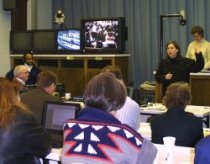By Bob Collins
March 2, 1999
REPRESENTATIVES OF TWO COMMUNITIES WHO SAY THEY HAVE MUCH IN COMMON struggled to define their agreements and outline a plan for solving their disagreements Tuesday.
Residents of Crookston and visitors to Lucille's Kitchen in north Minneapolis took part in a teleconference broadcast on KMOJ Radio and Minnesota Public Radio. Much of their discussion stemmed from an exchange at the first teleconference last month.
 |
Sarah Lagos Photo: Julie Swenson
|
The exchange between Carolyn Weber of Crookston and Sarah Lagos of Minneapolis was defined by the theme of Tuesday's show, "What you thought you said isn't what I heard.". In that exchange, Weber, who described herself as a "recovering farmer", outlined her use of education at the University of Minnesota-Crookston to rebuild her life. Lagos said what worked for a white farmer in Crookston doesn't necessarily apply to African-Americans in Minneapolis.
Hear the original exchange (1:14)
|
|
The exchange led to suggestions today that white people can't understand the plight of African-Americans. "We know white people are trying to understand," Lagos said, " and they are able to admit they can't."
The series of conversations - today's was the second of four - attempts to define the areas of agreement and understanding between the races. But part of today's debate struggled with claims that whites can't understand the plight of African-Americans. One caller said she was insulted by any suggestion that the farm crisis gives white people any additional ability to understand racism. "Black people have been killed merely because they are black," she said. " I doubt farmers are being killed because they're farmers."
 |
Steve Wash Photo: Julie Swenson
|
Steve Wash, appearing at Lucille's, said his family is more able to understand the plight of struggling whites than whites are to understand the plight of African-Americans. He said his family watched "The Grapes of Wrath" and cried because they felt sympathy. "We do feel for you," he said as he turned toward a TV monitor linked to Crookston. "But when we have a struggle, we don't feel the same sympathy in return."
Those at Lucille's also criticized Governor Jesse Ventura who has appointed a cabinet that is 100% white. They also said white people should be more upset about it.
 |
Randy Staten Photo: Julie Swenson
|
Randy Staten said "Why is it black people were the only ones to raise questions? The onus is always on black people. We have to coerce white people to respond. We have 50% of our people living below poverty. When the same situation occured on the Iron Range, we directed resources to solve the problem. With blacks, we're told 'they are the problem.'"
Professor Mahmoud El-Kati of Macalester College lamented that "no significant white person" complained to Ventura about the makeup of his cabinet.
 |
The scene in Crookston
Photo: Andrew Svec
|
Rev. Milo Mathison of Mentor, Minnesota helped spawn the rural-urban conversations by writing about his experiences with the declining economy in northwest Minnesota. "As African Americans living in the inner city, you are among the few that can honestly say to us, 'We know how you feel. We have been there', Mathison wrote.
While all participants appear to agree the ongoing discussions are an improvement, some find the exercise frustrating. One caller - identified as Ramon - finds the struggle for common ground difficult to hear. " No matter how many meetings you have, it's the same words but they have different meanings," he said.
Lucille's-Crookston Home




